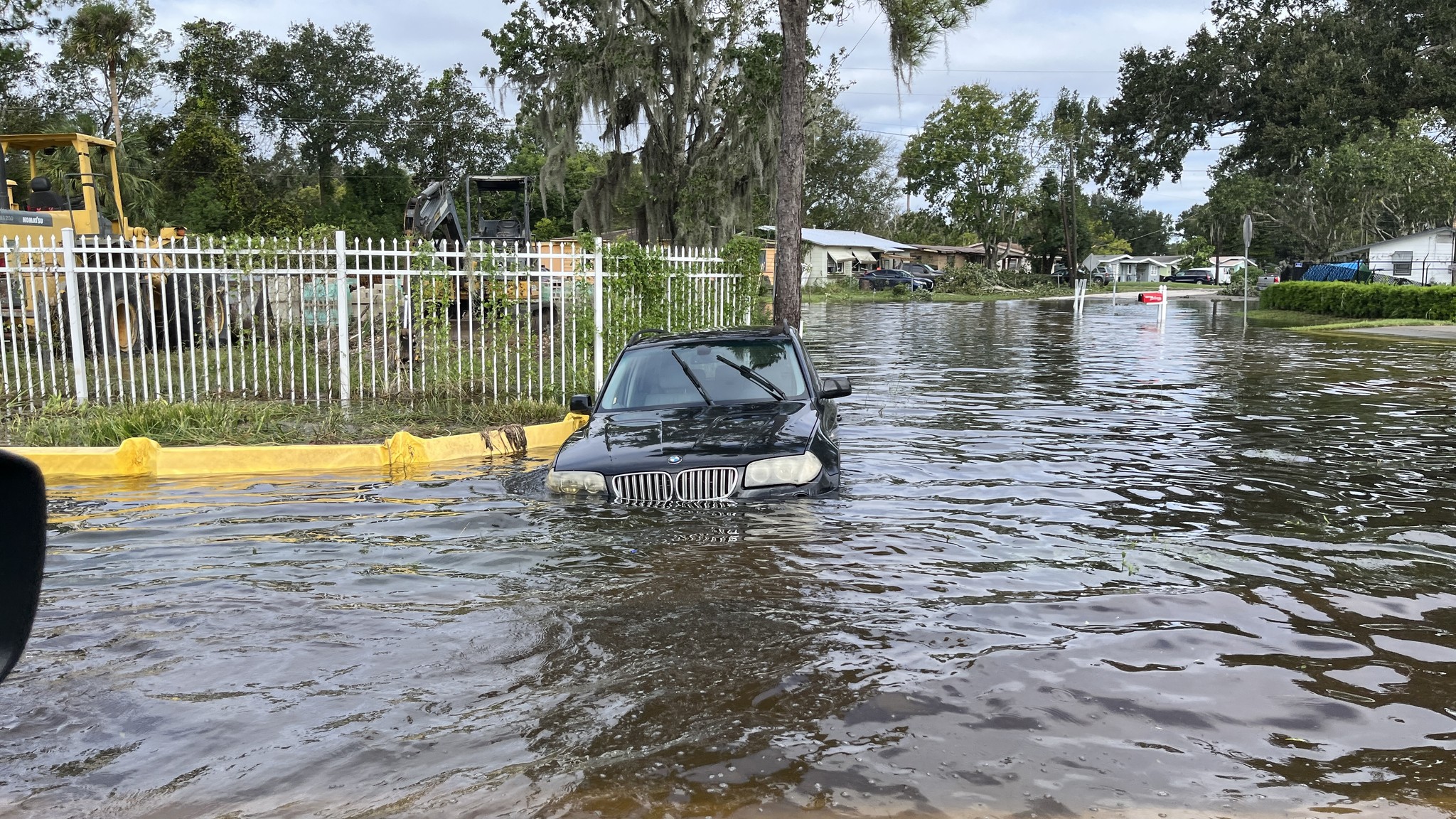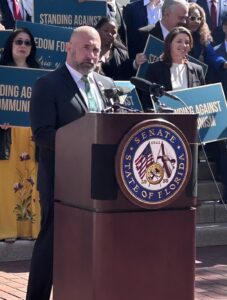By deleting mention of climate change, Florida legislators try to hide from the problem

The other day, because I was in a hurry, I swung through a McDonald’s drive-through and ordered one of their burgers. You know, the ones that seem less like cooked meat and more like a warm hockey puck.
But it’s OK! I told myself that it was actually filet mignon from Bern’s Steak House in Tampa. It was mmm-mmm good!
I learned this marvelous mind trick from our fine Legislature, which has been using it for some time now to persuade themselves that they’re effective when they are not. Remember four years ago, when they passed a “Clean Waterways Act” that doesn’t actually clean the waterways?
A more recent example: Rep. Jason Shoaf, R-Fantasyland, has sponsored a completely unnecessary bill to make it okay to kill bears, so long as it’s in self-defense. He contended it’s not for dealing with those regular old bears we have here in Florida, because they’re so shy. Instead, it’s to counter the threat of bears on crack. Yes, you read that right, BEARS ON CRACK.
“When you run into one of these crack bears, you should be able to shoot it, period,” Shoaf said.
Even though there are no real-life examples of Florida bears on crack, the fact that he conjured up that bizarre image (apparently taken from the non-documentary “Cocaine Bear”) means it was sufficiently real for the full House to pass this bill 88-29 and the Senate 24-12.
See how this magic trick works? You simply conceive of the image you want and you speak it into existence — POOF!. The opposite works, too. You erase the words you find troubling and just like that, the problem vanishes.
The best example of that latter approach comes from the dynamic duo of Rep. Bobby Payne, R-Hocus, and Sen. Jay Collins, R-Pocus, whom I have come to think of as the Penn & Teller of the Legislature.
These maestros of mental mastery have proposed a pair of bills, HB 1645 and SB 1624, that deal with the grave threat of climate change by
Voila! Problem solved!! Not even the spoon-bending Uri Geller could conjure half as well!
How does the trick work, you ask? It’s as simple as using the delete key on your computer.
For instance, take this language that’s currently in state law, singled out by the Tampa Bay Times:
“The Legislature finds that the state’s energy security can be increased by lessening dependence on foreign oil; that the impacts of global climate change can be reduced through the reduction of greenhouse gas emissions; and that the implementation of alternative energy technologies can be a source of new jobs and employment opportunities for many Floridians.”
Now observe closely as Payne and Collins snap their fingers. There’s a puff of smoke and now the law would read: “The purpose of the state’s energy policy is to ensure an adequate, reliable, and cost-effective supply of energy for the state in a manner that promotes the health and welfare of the public and economic growth.”
Just by removing any mention of climate change and greenhouse gas emissions, these bills make the whole issue go away. It’s exactly like that time David Copperfield made the Statue of Liberty disappear.
There’s just one teensy-weensy little problem: Outside of our extremely phallic Capitol in Tallahassee, climate change is still sticking around. No amount of smoke and mirrors will change that. And it’s creating all kinds of havoc for us folks who live in this state.
That means it’s messing with “the health and welfare of the public.” Oops, guess we need to hit that delete key some more! Quick, hum a few bars of the Lovin’ Spoonful’s “Do You Believe in Magic?” while Payne and Collins tie up that loose end.
Sweaty as Dick Nixon
Here’s something you may find hard to believe: That language about climate change that Payne and Collins want to remove? It was put into Florida law by their fellow Republicans.
The Grand Old Party has controlled Florida state government for the past couple of decades. For a little while, starting in 2007, Florida had a Republican governor and Legislature that actually cared about how the warming world might hurt our state. They even planned to set up a cap-and-trade system to limit carbon emissions from power companies.
But then along came Gov. Rick “I Don’t Care If My Own House Washes Away, Don’t Talk to Me About Sea Level Rise” Scott. He dismantled most of that progress before it ever got started.
While Scott ran around with his fingers in his ears shouting “LA-LA-LA-LA!” the effects of climate change worsened here in Florida.
Our hurricanes became more intense. Our storm surges surged further than ever before, inundating our many low-lying neighborhoods. Our rainy days became rainier. Our days and nights got hotter. Even the oceans crept closer to the boiling point, and the heat helped to fuel an increase in toxic algae blooms.
Right now, the Atlantic is already hitting record warm temperatures, and hurricane season is still three months away.
You can witness the warning signs of our warming world in the altered gender balance of sea turtle hatchlings, which is controlled by the temperature of the beach sand where they hatch. You could even detect it in the increasingly acidic quality of the seawater surrounding our peninsula.
You can see how it’s harming Florida by looking at a new mapping tool called Florida’s Climate Future. The map, produced by the folks at the Environmental Defense Fund, looks at such factors as the increasing heat, flooding and the rising cost of electricity.
“We built this because we wanted to make it clear to Floridians that we’re already picking up the tab for climate impacts to our state,” said Dawn Shirreffs, Florida director of EDF.

I was particularly curious to see how climate change is affecting the home districts of our two political Houdinis. Putnam County, home of Rep. Payne, saw 85 days last year when the heat index topped 100 degrees. In Hillsborough County, Sen. Collins’ district, the number of days over 100 degrees was a whopping 107 – four more than in nearby Pinellas.
Phew! Perhaps these two legislative prestidigitators are trying to wipe away mentions of climate change because they’re ashamed of how sweaty they are! So many hot days like that would leave any politician perspiring like shifty Dick Nixon at the 1960 debates.
Dropping our letter grade
Say what you will about him (I sure have), but at least Gov. Ron “I Like the Bully Part of the Bully Pulpit” DeSantis has acknowledged that climate change exists.
Granted, he’s claimed that the solution is to burn more fossil fuels, not less, which scientists say is nonsense. Still, he’s also spent millions to protect coastal property owners from rising seas. That’s more than now-Sen. Scott ever did.
As a result, the Surfrider Foundation has graded Florida as “average” among the states for responding to the effects of climate change — until last month. That’s when we dropped a full letter grade, from a C- to a D-.
That may not bother Sen. Collins, whose response to Florida students’ declining test scores has been to call for teaching kindergarten kids about the evils of communism. But everyone else might be interested in why.

A major reason for the downgrade, according to Emma Haydocy, the Florida policy manager of Surfrider, is that our Legislature has made it cheaper for people to build destructive seawalls in front of their private beachfront property.
Our lawmakers did this in the name of hurricane recovery, but it’s really just an unconstitutional cash grab for taxpayer dollars, she explained. They created a $50 million Hurricane Restoration Reimbursement Grant Program that uses public money to pay for building seawalls and adding more sand to private land, she said.
Seawalls are old technology. We know now that everywhere someone builds a seawall, it destroys the rest of the beach around it through increased erosion and blocking the flow of new sand.
“You’re paying for your neighbor’s seawall, and that seawall is going to take away your piece of paradise,” Haydocy told me.
When lawmakers first set up the fund, she said, it was supposed to be temporary, and to pay no more than $150,000 to any one homeowner. But then it was extended another year and the limit bumped up to $300,000.
“Now they’re contemplating extending it by another year,” she told me, “and increasing it to $600,000 per project.”
The other reason Surfrider dropped us to an almost-F: The Legislature has thwarted local governments from changing anything about where people build in the wake of hurricanes like Ian and Idalia.
That means that cities and counties are not allowed to block anyone from rebuilding homes or stores in the exact same spot where they were destroyed, as if it won’t ever happen again.
So to sum up: Lawmakers spend tax money to ruin our beaches. They force local governments to allow new residents to die in the next storm. But they say that the REAL problem here is that we have laws on the books that mention climate change and that’s what they want to demolish.

Payne and Collins’ bills would also remove from current law the recognition that “implementation of alternative energy can be a source of new jobs and employment opportunities for many Floridians.” And they would eliminate the authority of the Florida Department of Agriculture and Consumer Services’ Office of Energy to set renewable energy goals.
“These bills would take all the progress that Florida has made and actually roll us backward,” said Greg Knecht, executive director of the Nature Conservancy in Florida.
Like the Marlboro Man

These two bills appear to be part of a nationwide trend, according to Alissa Jean Schafer of the Energy and Policy Institute.
“There’s a push by the fossil fuel industry to make sure Americans stay hooked on fossil fuels,” she said.
Sure enough, talking about his bill in a House Appropriations Committee meeting, Rep. Payne seemed openly hostile to the notion of trying to end our reliance on coal, oil, and gas to generate power.
He contended that America has spent billions on “a climate change initiative and ideology that is unfitting for our country,” then added, “Our country would not be where it is today without fossil fuels.” (Hey, he’s right — we wouldn’t be so hot, wet, and miserable.)
Perhaps Payne feels that way because he spent 38 years at the Seminole Electric Cooperative, including working as a manager of operations at the Seminole Generating Station in Palatka.

That Palatka power plant creates power by burning coal delivered daily from mines in Kentucky and Illinois. It’s on a list of the 100 dirtiest power plants in the U.S. I am no physician, but I imagine an X-ray of Rep. Payne’s lungs must look something like the Marlboro Man’s.
Sen. Collins has been more circumspect about the intent of the bills. He’s focused more on the portions that tout natural gas as the answer to everything and call for blocking wind turbines from being built anywhere near the Florida coast.
When another senator asked if he was putting the Legislature in the position of picking winners in what should be an equal contest for what works, he insisted that he wasn’t.
“This is about maintaining energy stability in our state,” he told the Fiscal Policy Committee this week.
Here’s a fun fact about Sen. Collins: He works for a company that specializes in responding to weather-related disasters.
After Hurricane Ian hit in 2022, his company, Operation BBQ Relief, won a $4.57 million contract from the state to deliver food supplies to the survivors, the Orlando Sentinel reported last year.
Far be it from me to claim that Sen. Collins wants us to drop our efforts to halt climate change just so his company can make money off the resulting disasters. Still, that would make more sense than claiming it’s about “energy stability.”
Incidentally, these bills have strong backing from House Speaker Paul Renner, whom I have previously noted is a fossil fuel fool. You may not be surprised if I tell you that two years ago, his PAC received $25,000 from a conglomerate called Koch Industries. Among Koch’s main interests: oil, oil and gas pipelines, and coal.
Pass the Mickey D’s
Believe it or not, both of these bills have cleared their respective committee stops and appear headed for the full House and Senate.

You can bet Renner will push it through the House. He offered a nonsensical defense of the Payne-ful bill to a reporter who tried to pin him down.
“I don’t think you should interpret anything we’re doing about maybe an obsolete program or whatnot as a lack of commitment to anything that’s happening in the environment,” he insisted to the Times. “To the contrary … we’re not backing away one bit from a resilient state and taking whatever the climate sends us.”
In other words, Florida will continue to spend an ever-increasing amount of taxpayer money on pipes and pumps and seawalls, but we consider anything that might deal with the causes of climate change to be “an obsolete program or whatnot.”
As a result, we’ll have to continue “taking whatever the climate sends us,” including increased heat, stronger hurricanes, and so forth.
Whether Senate President Kathleen Passidomo will allow these two magicians to cast their confounding spell over her chamber remains to be seen. I’m hoping she sees through their act and rings down the curtain.
Otherwise, we’ll have to pin our hopes on DeSantis waving his magic wand and vetoing it. Unfortunately, based on his record, I fear that’s about as likely as a McDonald’s burger turning into filet mignon.
Comments
Post a Comment